There is a lot of information swirling around the internet about gastric sleeve surgery and its outcomes. This article will break down exactly what you can expect from your gastric sleeve surgery including both short-term and long-term results (yes, there’s a difference).
Let’s first discuss the surgery itself. The gastric sleeve is also known as a sleeve gastrectomy and takes place when the surgeon removes a portion of the stomach, altering its shape to a narrow “sleeve.” Because this newly formed sleeve is significantly smaller than its original shape, it can only hold a fraction of food and liquids. This allows for somewhat “easy” and rapid weight loss, and thus favorable gastric sleeve results. However, over time, this weight loss will slow and likely stop. Some even find the scale moving in the opposite direction.
For this reason, it is important to educate yourself as much as possible on all aspects of the surgery. If you are on the fence, you can learn about the pros and cons of gastric sleeve surgery here. For now, let’s dive into the nitty-gritty of gastric sleeve results.
Gastric sleeve results
This section is best broken up into short-term and long-term results. Short-term results are usually occurring within the first two to three years, while long-term results refer to the period five to 10 years after surgery.
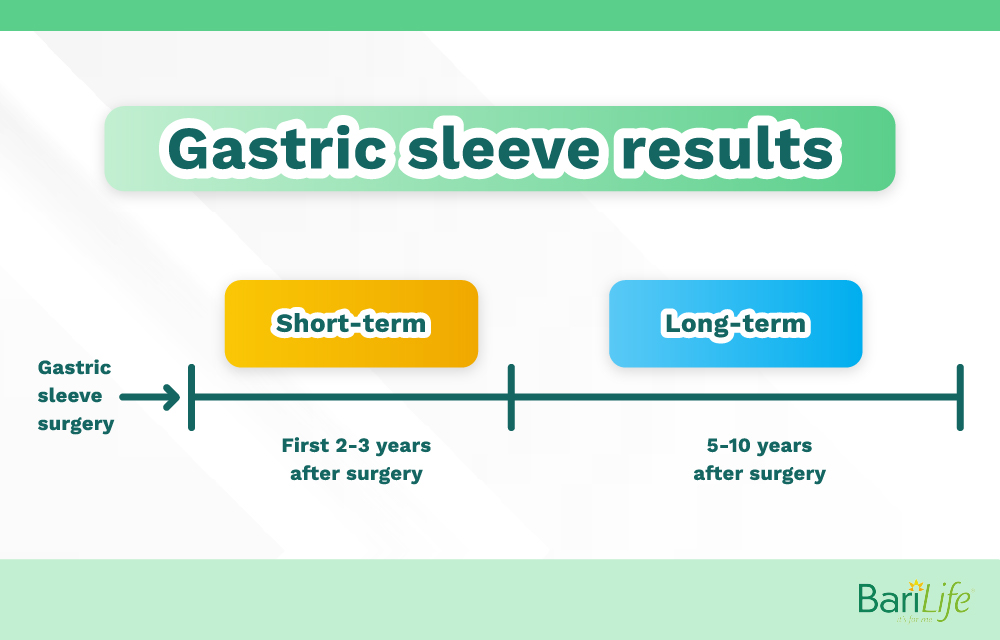
In most peer-reviewed research studies, percent excess weight loss (%EWL) is used to determine overall weight loss. Because it is a percentage, it becomes simple to compare one person’s weight loss to another’s.
Percent excess weight loss is calculated by figuring out the patient’s ideal body weight and then subtracting it from their pre-surgery weight. The remainder is their excess body weight. The weight that the patient loses after surgery comes from their excess body weight. When looked at as a percentage lost, it becomes the percent excess weight loss.
Imagine you have an excess bodyweight of 100lbs, and then lose 50lbs. Your percent body weight loss is 50%. If you would like more details on %EWL, check this out.
Short term gastric sleeve results
Results in research studies vary somewhat, however, the general findings are in the same ballpark. Check out the table below for a simplified version of these findings. One study revealed %EWL to be 71% at 6 months, 68% at 1 year, 63% at 2 years, and 49% at 3 years. Another study determined %EWL to be 52.8% at 6 months, while this study determined %EWL to be 49% at 1 year. A compilation of many studies, known as a literature review, determined %EWL to be 50.6% by 6 months, and 51.8% by 1 year. The final study showed the average percent weight loss to be 47.2% at one year, 60.7% at two years, and 66% at three years.
| Time Since Surgery | % Excess Weight Loss |
|---|---|
| 6 Months | 50 - 71% |
| 1 Year | 49 - 63% |
| 2 Years | 60 - 63% |
| 3 Years | 49 - 66% |
As you can see, there is significant variation in short term gastric sleeve results across the board. This is likely due to a variety of reasons ranging from healthy habit changes and exercise to hormones and medications.
Long term gastric sleeve results
Determining long term gastric sleeve results becomes a bit more tricky because people often stop participating in studies after many years have passed, and thus there are fewer studies to pull from. Nonetheless, let’s dive in.
The first study to mention found 5-year gastric sleeve results to have a percent excess weight loss of 62.9%. Another study determined %EWL to be 63.83% at 5 years and 64.1% at 6 years. A literature review found the percent excess weight loss to be 62.3% at 5 years, 53.8% at 6 years, 43% at 7 years, and 54.8% at 8 years. Another literature review found %EWL to be 51% at approximately 8 years post-op. A comparison study found gastric sleeve results to be 57.3% EWL at 5 years. The final study determined the average percent weight loss to be 69.9% at 5 years, 70.6% at 6 years, and at 76.6% 7 years post gastric sleeve surgery.
| Time Since Surgery | % Excess Weight Loss |
|---|---|
| 5 Years | 57.3 - 69.9% |
| 6 Years | 53.8 - 64.1% |
| 7 Years | 43 - 76.6% |
| 8 Years | 51 - 54.8% |
As you’ll notice, there is even more variation between long-term gastric sleeve results. This is likely due to the variation in patient participation across studies.
What can we learn from these gastric sleeve results?
Interpreting gastric sleeve results can be confusing. An important takeaway is that most of the numbers fall at or above 50% excess body weight. That means if an individual has 100lbs to lose, they will most likely lose at least 50lbs and keep at least those 50lbs off long term.
Benefits and complications
Another important gastric sleeve result to take into account is the benefit of improved health. People experience many health benefits post-op.
Some of which include:
- Complete resolution of Type 2 Diabetes
- Reduced blood pressure and cholesterol
- Improve fatty liver disease
- Improve or resolve sleep apnea
- Improve overall confidence
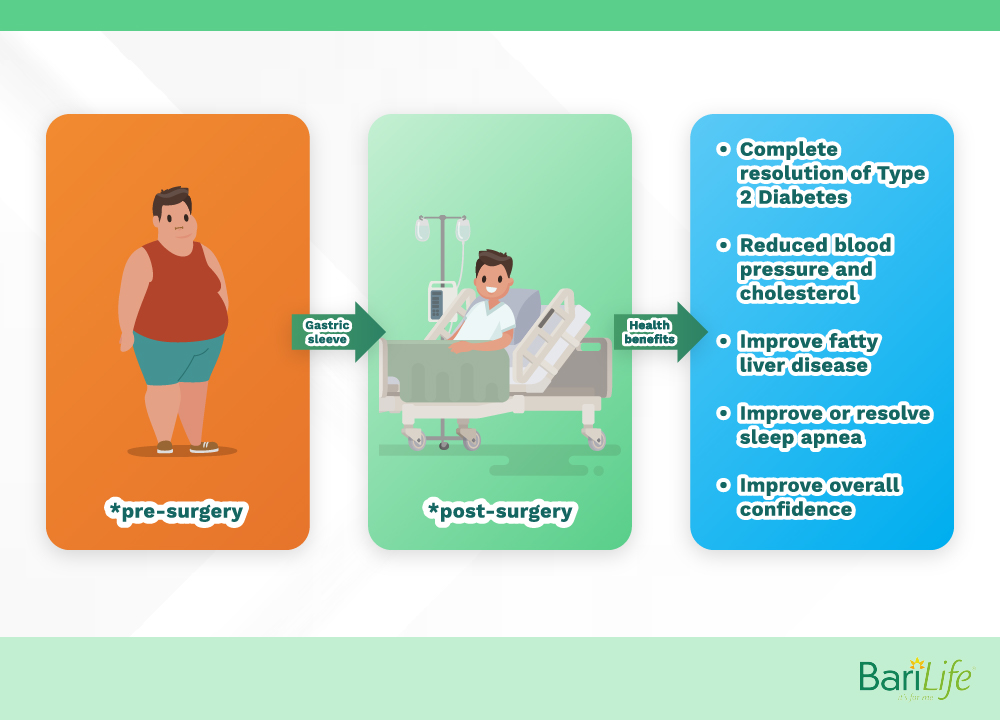
With any surgery, there is always a risk for complications. You can learn more about gastric sleeve complications here and here, but to give you an idea, some complications include:
- Nausea and vomiting
- Delayed healing
- Blood clots
- Vitamin and mineral deficiencies
- Dumping Syndrome
- Acid reflux
- Gallstones
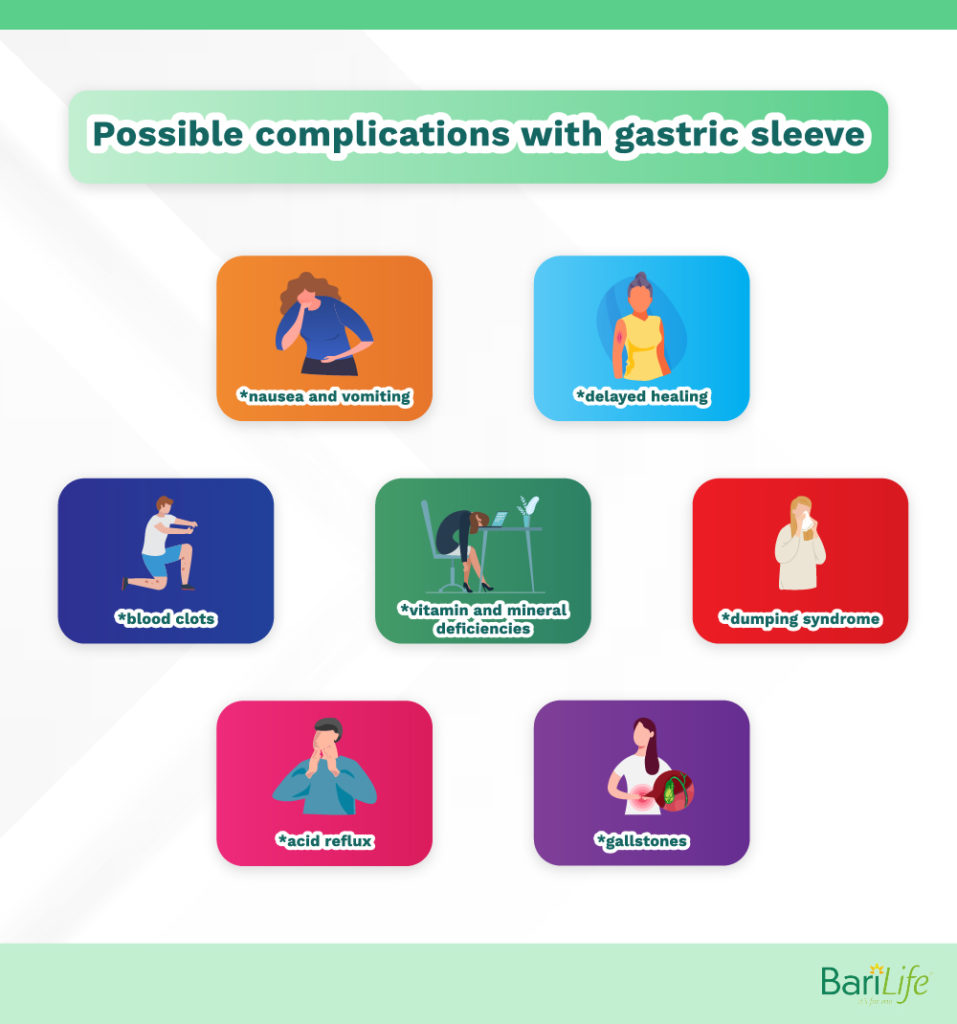
What factors influence my gastric sleeve results?
There are many factors that can influence a patient’s gastric sleeve results including:
- Not adhering to the doctor’s recommendations. After a surgery like the gastric sleeve, your physician will provide you with important post-surgical instructions ranging from gradually introducing solid foods, to vitamin and mineral supplementation, and exercise recommendations. For the best gastric sleeve results, it is important to follow these instructions closely.
- Falling into old patterns. It is common for people to gradually loosen up on their food restrictions. This is often acceptable if the diet remains healthy overall. However, when individuals fall into old unhealthy patterns of overeating or bingeing, the weight will likely return.
- Not exercising. Many people who undergo the gastric sleeve procedure are not regular exercisers due to the difficulty to move comfortably while carrying excess weight. It can be a challenge to incorporate physical activity into a regular routine, but the reward of easier weight management, increased metabolism, and improved bone health is well worth it.
- Outside factors. There are additional factors that can influence gastric sleeve results that fall beyond the patient’s responsibility. These include variations in surgical techniques, prescribed medications, and hormones.
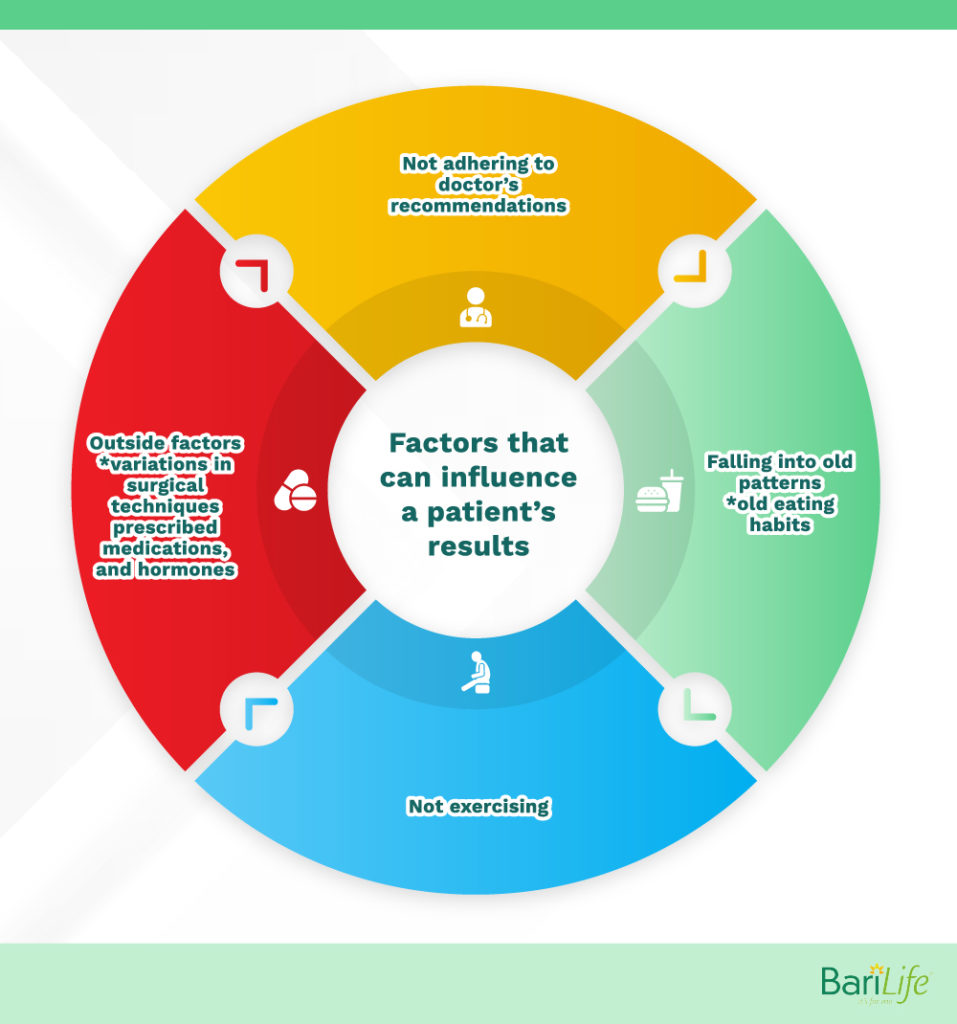
Secrets to long term success
Of course we all want to have the best possible gastric sleeve results. We want to lose the highest percent of excess body weight, and keep it off long term. Those that do, often take similar measures. Let’s divulge some secrets for successful gastric sleeve results.
Prevent stomach stretching
Your newly slender stomach can actually stretch back to it’s prior, more robust, shape. It is important to capitalize on your smaller stomach and try to maintain its smaller size long term.
This can be done by:
- Not overeating. It may seem obvious, but the more we eat and fill up our stomachs, the more our stomach has to stretch to accommodate the increased amount of food. Over time, the stomach can be stretched out to its original size.
- Avoiding binge eating behaviors. Similar to overeating, binge eating often occurs when an individual feels deprived or is withholding food for an extended time, then eats a large amount of food in a small amount of time. The results over time are a stretched stomach and reduced weight loss.
- Not grazing. Grazing refers to eating smaller amounts of food regularly throughout the day. Grazing has been linked to increased overall calories consumed, as well as a reduced amount of overall weight loss post-surgery. It is important to eat intentionally and space meals and snacks out over the course of the day.
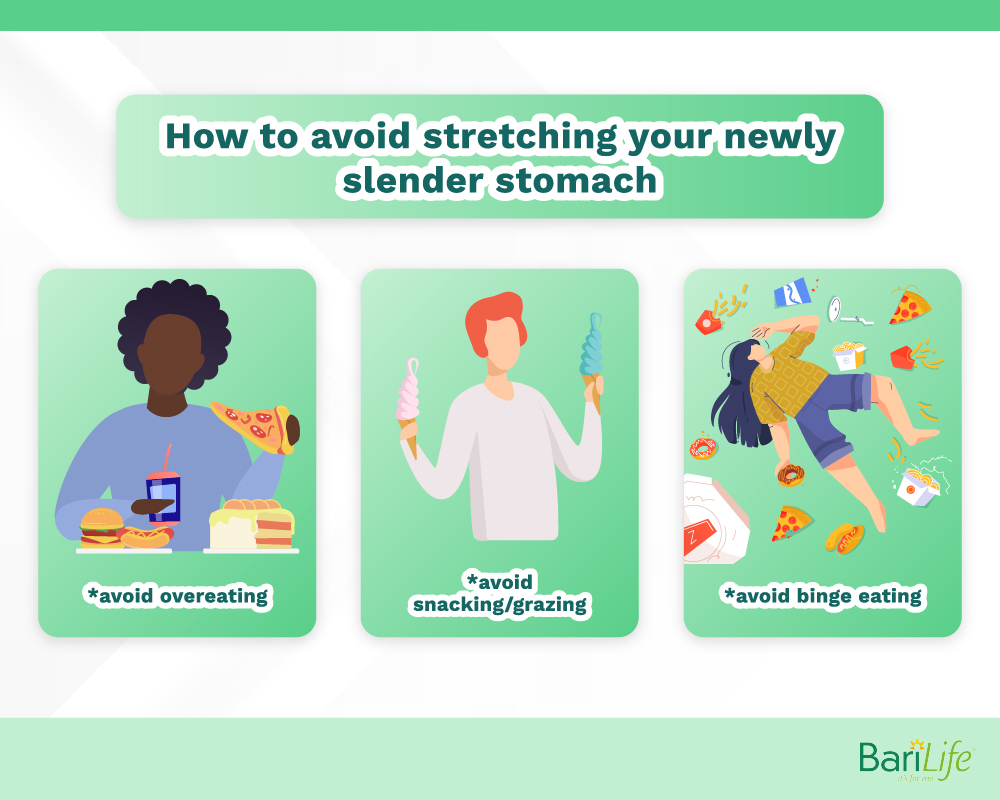
Reduce incidence of weight gain
Well, reducing weight gain is everyone’s goal, right? This can be way easier said than done though and is often achieved by:
- Preventing stomach stretching. See the section above where this is discussed in detail.
- Staying away from old, unhealthy patterns. Our eating habits are formed in childhood and have deep cultural, social, and emotional roots that can be extremely difficult to alter. However, when these habits are unhealthy and lead to obesity and other health conditions, it is imperative to learn new habits. The benefits of working towards habit change can lead to healthy patterns, inner healing, and true long-term success. Consider seeking outside counseling in the form of behavior change therapy or other self-help support to learn new and lasting strategies for improved health.
- Exercising. It cannot be stressed enough the importance of exercise in losing and maintaining weight. Studies show that exercise is crucial for increased weight loss for bariatric surgery patients. However, for many, exercise was not a habit prior to surgery and must be learned gradually over time. The American Heart Association recommends 150 physically active minutes each week, or 30 minutes five days a week. Don’t worry about starting there. As soon as you are cleared by your surgeon, start slow with just a few minutes 3 days a week and work yourself up to do more over time. Remember, consistency is key.
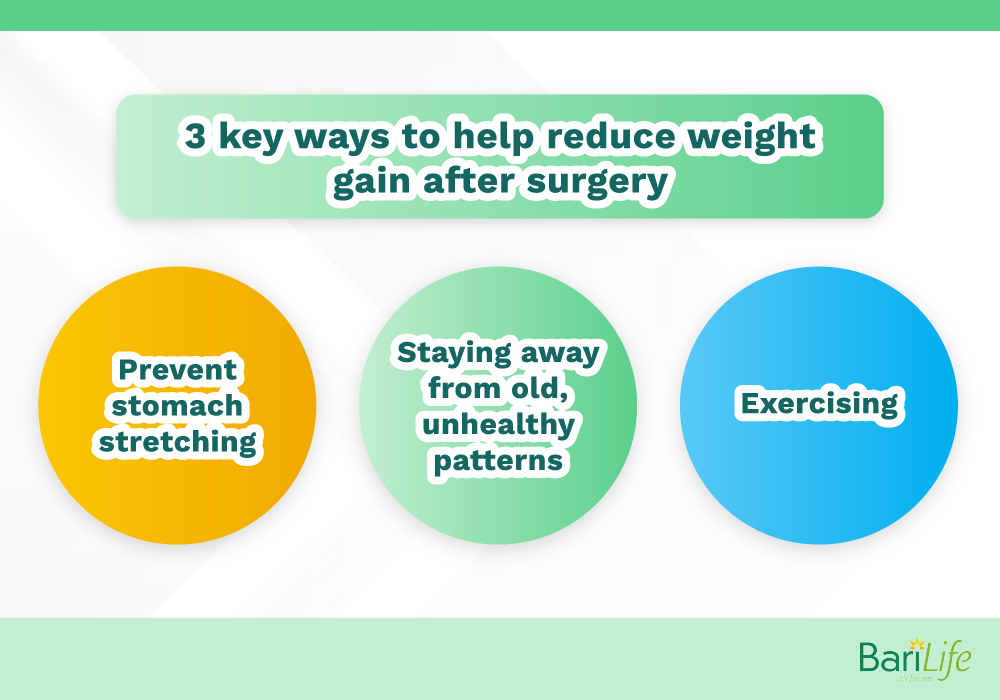
Avoid nutritional deficiencies
Studies demonstrate that it is common for obese individuals to have some degree of vitamin and/or mineral deficiency. Add to that a surgery in which eating a variety of foods becomes a bit more complicated, and you will see how nutrient deficiencies are prevalent among those with bariatric surgery.
Common deficiencies include:
- Iron
- Vitamin B12
- Folate
- Copper
- Calcium
- Vitamin D
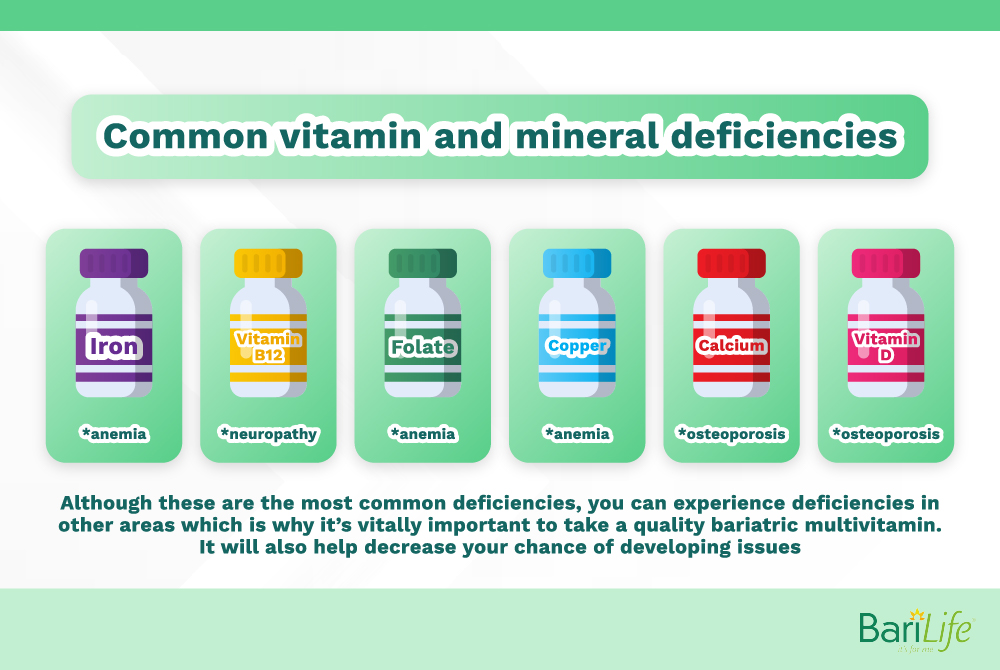
These deficiencies can lead to more serious health problems such as osteoporosis, anemia, neuropathy, and other conditions.
For best results strictly adhere to your physician’s instructions for vitamin and mineral supplementation. If for some reason, you weren’t given direction to take a nutritional supplement post-op, reach out to your doctor for further instruction.
In summary
Getting the most of your gastric sleeve results is what everyone wants. However, not everyone gets there without challenge. Although short-term gastric sleeve results vary from long term, there is clear evidence that long term success is not only possible, but likely.
As with any surgery, there are benefits and complications that come along with it. It is important to educate yourself on these and have an open dialogue with your surgeon to discuss questions and hesitations that you may have.
By following doctor’s orders, ensuring that nutrient needs are met, focusing on creating new, healthy habits, and exercising regularly, you will set yourself up for long-term gastric sleeve success.




My weight loss journey has not been easy. I had gastric sleeve surgery 3 years ago and lost 70lbs the first year. I’ve regained 15lbs since and have tried to lose them for the last few months (unsuccessfully). Despite suffering from fibromyalgia, I am an active person, exercise as often as I can (3-4 days a week), and drink as much fluid as I can (I’m up to 48 oz a day). Of course the goal is 64 oz. there are no tricks to maintaining, just consistency and will power (and small portions!) I’ve plateaued the last 3 months, so I have gone back to the basics (pre-surgery diet) and upped my exercise times from 30 minutes to 45 minutes to an hour. I’m hoping to kick start the weight loss again soon.